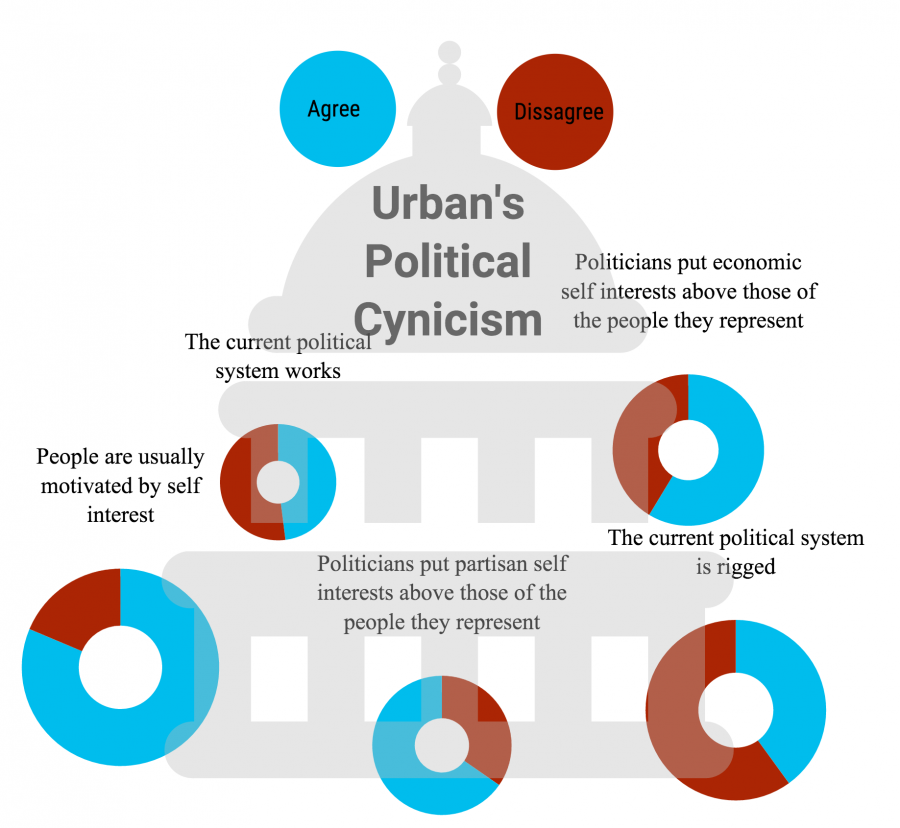Election cycle exposes political cynicism at Urban School of San Francisco
Infographic of measuring politically cynical responses at Urban, made by Kian Nassre.
“I’m so infuriated and disgusted at all the politicians who are not in it for the community they swore an oath to but for their greedy selves,” tweeted by Miss Peregrine @Dafifthsistah on Feb. 8th, 2016. This is one of many tweets from this election cycle exhibiting political cynicism: the belief that politicians are motivated almost entirely by self-interest.
Several news outlets have theorized that a growing amount of political cynicism has translated into reduced voter turnout and allowed Donald Trump to win the election. Since the deciding states on election night had margins often under 100,000 votes, one of the main factors in Trump’s victory in these swing states was a lower voter turnout in specific Democrat counties such as those surrounding Milwaukee and Philadelphia.
When asked if he has witnessed political cynicism at Urban School, Civics and Elections teacher Dan Matz said, “absolutely, in the past and this year as well. And I would ask how could you not be cynical? High school students coming into their own political identities want to see goodness, want to see possibility, are idealistic in their approach to politics. And then to get hit by the reality of politics makes students cynical.”
Charisse Wu, who also teaches Civics and Elections, said “I find that most of the time Urban students are less likely to view political actions and actors as being motivated less by self interest and more to do with beliefs and ideology,” also attributing the cynicism she has witnessed to the current political environment. She further said the problem is, “political disaffection, the fact that you are distancing yourself and not wanting to engage whatsoever in politics because of a level of grossness in watching either political candidates speak or debate, or what the political parties stand for.”
A survey conducted by The Urban Legend between October 14th and October 20th confirms Urban has a tendency towards cynicism. Out of 75 persons surveyed, 61 agreed with the statement, “people are usually motivated by self-interest.” In regards to political cynicism, 44 agreed politicians put economic self-interests above those of the people they represent and 49 that politicians put partisan interests above those of the people they represent.
Both Matz and Wu said their hope was the election classes at Urban provide a platform to confront political cynicism. By bringing the issues inspiring political cynicism into the academic spotlight, they aspire to leave students with enough information to process them instead of just falling into cynicism.
“In an ongoing way I think that this election has gotten uglier, so I do want to give students an opportunity in the last four or five weeks of the election to think about politics in a more positive light. To that end we are going to look at some local issues, not that the local scene doesn’t have its own ugliness, but just to get away from these candidates. Thinking about activism and policy making at a local level might make a difference,” said Matz.
“The reason that Urban has the Civics and Elections class is to combat that very phenomenon and trend we are seeing especially among young voters who feel like, ‘what’s the point’ or ‘how does this work’ and to see that actually in many ways we need a more educated and diverse set of people to enter into politics,” said Wu. “My hope is that the Civics and Elections classes are there for us to have a designated space to engage and to struggle with feelings of disaffection. What I’ve seen from Urban Students is that they are actually more driven, especially in the elections classes, to dig and figure out ‘what do I believe? and that is what I believe we want out of an informed citizenry.”
Wu’s logic for engaging with political cynicism is based on the concept that “if anything, critical thinking creates the need to see that democracy is created by the people who are involved in it and the people who care. It actually matters for you to express your political stance and to know what it is that you believe. We actually need an informed electorate to shape our policies, to hold our leaders accountable and to change the political terrain.”
In response, Matz said, “the reality is that we have a broken system, from gerrymandering, to the electoral college, to election finance, to voter ID laws; students will not come out with a rosy view of politics, but by thinking critically about politics, and even coming to negative conclusions about it, there can be a lot of learning.”












